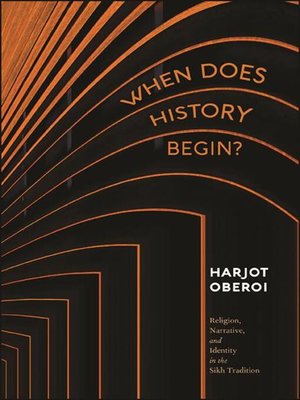When Does History Begin?
ebook ∣ Religion, Narrative, and Identity in the Sikh Tradition
By Harjot Oberoi

Sign up to save your library
With an OverDrive account, you can save your favorite libraries for at-a-glance information about availability. Find out more about OverDrive accounts.
Find this title in Libby, the library reading app by OverDrive.



Search for a digital library with this title
Title found at these libraries:
| Library Name | Distance |
|---|---|
| Loading... |
Documents how the premodern techniques of narrating the past in South Asia were deeply transformed by colonial modernity, resulting in newer forms of truth-telling within the Sikh community.
Focusing on important issues in Sikh religious identity and memory, Harjot Oberoi shows how premodern techniques of narrating the past and truth-telling in South Asia were deeply transformed by colonialism. Indian historiographical praxis has long been problematic. Al-Biruni, the eleventh-century polymath, was puzzled by how people in the subcontinent treated the protocols of history; it escaped his learning that Indian narrative constructions of the past were embedded in an intricate canon of poetical traditions and represented a radical departure from historical narratives in the Islamic, Sinic, and Greco-Roman worlds. Where others tended to search for "facts," people in South Asia looked for "affect." This alternative model for comprehending and evaluating the past-through aesthetics and gradients of taste-generated a crucially different variety of historical consciousness. Oberoi's examination of the Sikh tradition demonstrates what modern critical narrative achieves when it moves away from classical models, traversing significant moments in colonialism, coercion and protest in the Raj, the production of knowledge, the rise of secular nationalism, and modern notions of the self within and outside India.







